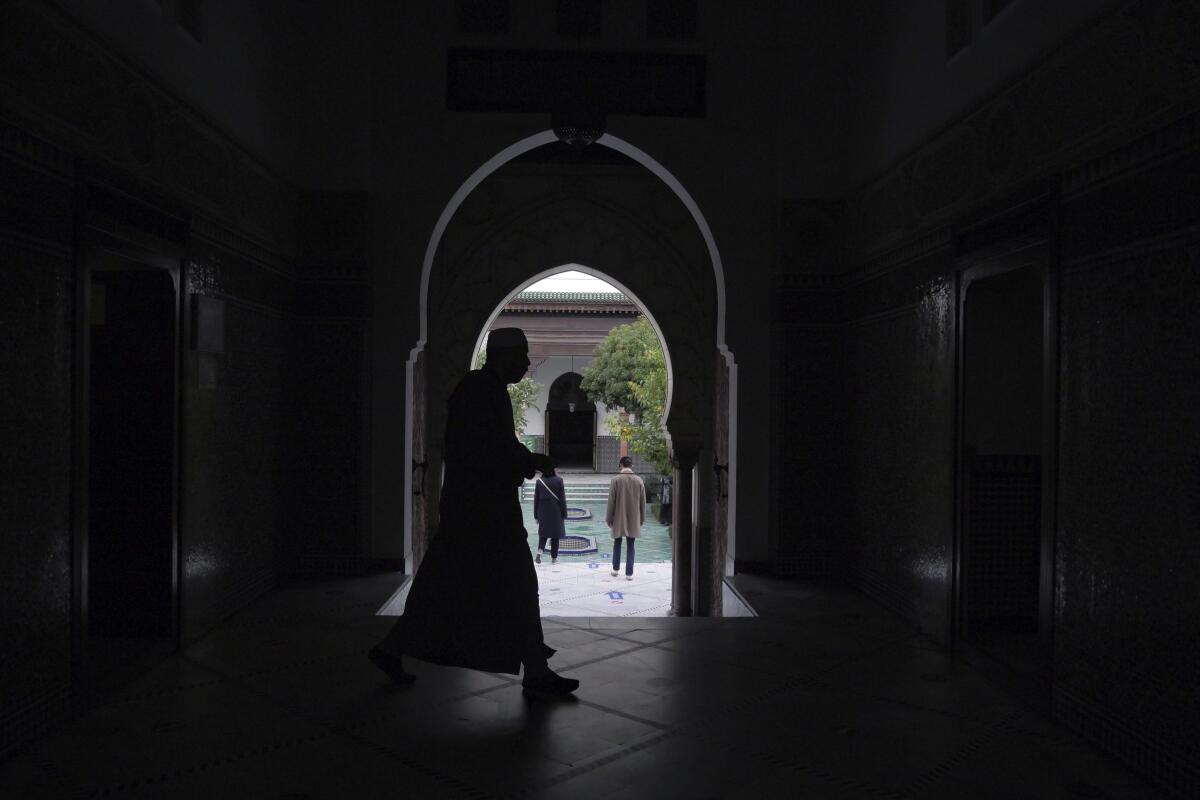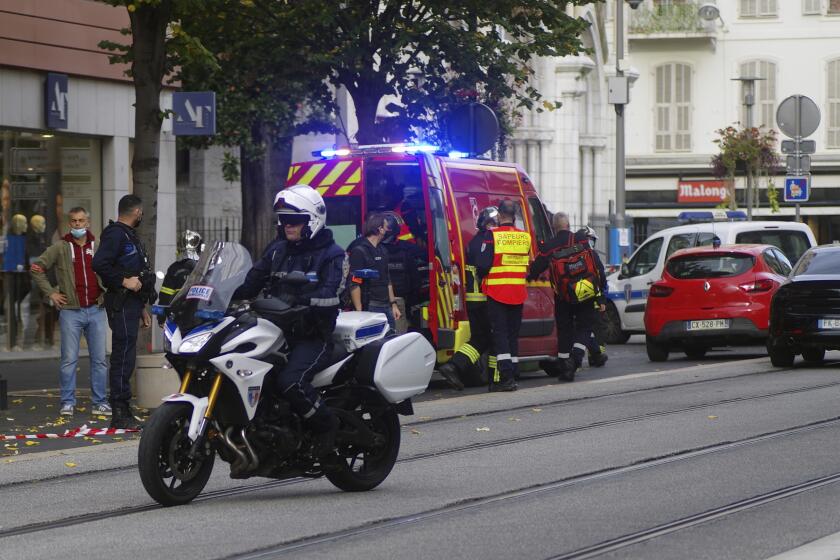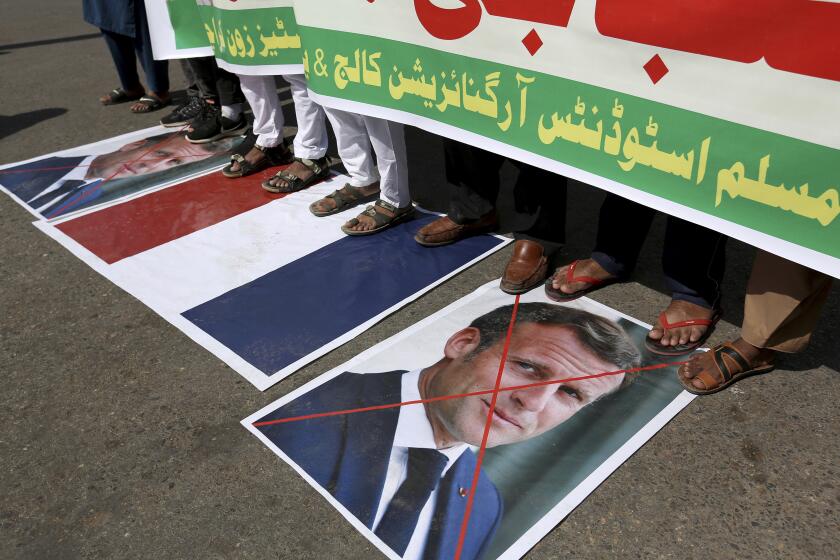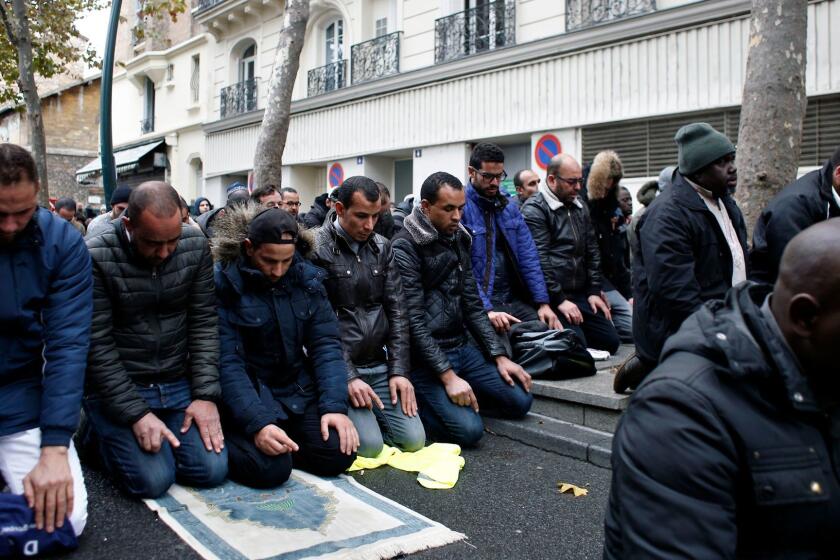‘There is fear’: France’s Muslims worry over increasing stigma after attacks

- Share via
PARIS — The pressure rises with each gruesome attack. After three in five weeks, France’s Muslims are feeling squeezed.
A spotlight of suspicion was trained on them again even before the latest acts of extremist violence. President Emmanuel Macron has forged ahead with his effort to rid Islam in France of extremists, a project he calls “separatism,” a term that makes Muslims wince.
Amid intensifying rhetoric and fresh attacks attributed to Islamic terrorism, including the killing of three people last week at a church in Nice, Muslims in France have kept their heads down and chins up. But deep down, some are squirming, feeling they are being held collectively responsible.
“It’s worrisome for Muslims,” said Hicham Benaissa, a sociologist who specializes in Islam in the workplace. Within his network, he said, some “talk about leaving France. The situation is tense. There is fear.”
Islam is the second-most-common religion in France, the country with the largest Muslim population in Western Europe. But France’s estimated 5 million Muslims have had to walk a delicate line in search of full acceptance in what for many is their nation of birth. Discrimination casts a shadow over some and is an outright barrier to mainstream life for others.
France’s cherished value of secularism, which is meant to ensure religious freedom, has in recent years been used by the state to rein in customs practiced by some Muslims. The president’s proposed law may mean further tinkering with the 1905 secularism law that was born of a conflict with powerful Roman Catholic clergy.
French anti-terrorism prosecutors are investigating a fatal knife attack at a church in the Mediterranean city of Nice.
Macron has prompted angry protests and calls for boycotts of French products this past week in Muslim-majority nations around the world, from South Asia to the Middle East. He is accused of spreading anti-Muslim sentiment by defending the French right to caricaturize the Prophet Muhammad and eulogizing a schoolteacher who was beheaded after showing the cartoons in class.
The teacher, Samuel Paty, was attacked outside his school Oct. 16 by a teenage refugee of Chechen origin. That assault came just three weeks after a young Pakistani refugee injured two people in Paris outside the former offices of Charlie Hebdo, the satirical newspaper that first published the Muhammad cartoons. And on Thursday, a young Tunisian man killed three people inside a Roman Catholic basilica in the southern city of Nice.
France’s Muslim leaders have been unfailing with their expressions of solidarity with victims and their families. The Nice knife attack “touched brothers and sisters who were praying to their Lord. I am deeply Christian today,” said the imam of Nice’s Ar-Rahma Mosque, Otman Aissaoui.
But “once again we are stigmatized, and people move so fast to lump things together,” Aissaoui added, reflecting the deepening discomfort of France’s Muslims, most of whom are from former French colonies in North Africa.
Thousands of Muslims worldwide join protest against France as its president vows to protect the right to publish caricatures of the Prophet Muhammad.
Muslims “are neither guilty nor responsible. ... We shouldn’t have to justify ourselves,” said Abdallah Zekri, an official of the French Council for the Muslim Faith.
The attacks and Macron’s “separatism” plan, which includes a partial overhaul of the way Islam is organized in France, from the training of imams to management of Muslim associations, have reinforced the divide. They also have focused attention on the cherished value of secularism, which is enshrined in the French Constitution but not clearly defined.
“The presence of Islam was not something foreseen by French society,” said Tareq Oubrou, a leading imam in Bordeaux.
Tensions have run high in the past, notably with changes to the secularism law, including a 2004 statute banning headscarves in classrooms and another in 2010 banning face coverings.
“Secularism has always been a smokescreen ... a hidden way to treat the question of Islam,” Benaissa said.
News Alerts
Get breaking news, investigations, analysis and more signature journalism from the Los Angeles Times in your inbox.
You may occasionally receive promotional content from the Los Angeles Times.
The rise of Islam into public view was gradual and mostly went unnoticed until the far right seized upon it as a threat to French identity. Over the years, mosques have multiplied, along with Muslim schools.
Muslim men initially came to France to take menial jobs following World War II. In the 1970s, immigrant Muslims working in car factories, construction and other sectors were “absolutely essential to French industry,” Benaissa said. Renault, for instance, installed prayer rooms.
“Today, when a veiled woman arrives in a company, there is ... a revolt. What happened?” Benaissa asked.
Many Muslims, unlike their parents or grandparents, are getting educations, better jobs and erasing the “myth of return,” he said.
Tensions erupted Friday as French officials and residents of a Paris suburb tried to block Muslims from praying in the street — a dispute that reflects nationwide problems with mosque shortages.
Macron conceded in a speech that France bears full responsibility for the “ghettoization” of Muslims in housing projects but insists that his planned law is not about stigmatizing Muslims.
Yet stigmatism is part of life in France for many, from being singled out by police for ID checks to discrimination in job searches.
“The Muslim is reduced to his religion,” said Oubrou, the Bordeaux imam. “Everything is not Christian in the life of a Christian.”
Islam has multiple strains in France, including moderate and radical interpretations of the Quran.
In his project, Macron envisions measures such as training imams in France instead of bringing them in from Turkey, Morocco or Algeria.
Benaissa doesn’t underestimate the “ideological offensive” of political Islam, but says a ferocious public debate is reducing Islam to a single fear.
“Islam is not Islamism, a Muslim is not an Islamist, an Islamist is not necessarily a jihadi,” he said. “What I fear is that identities radicalize with, on one side, those claiming the Muslim identity and, on the other, those claiming the identity of France.”
More to Read
Sign up for Essential California
The most important California stories and recommendations in your inbox every morning.
You may occasionally receive promotional content from the Los Angeles Times.













